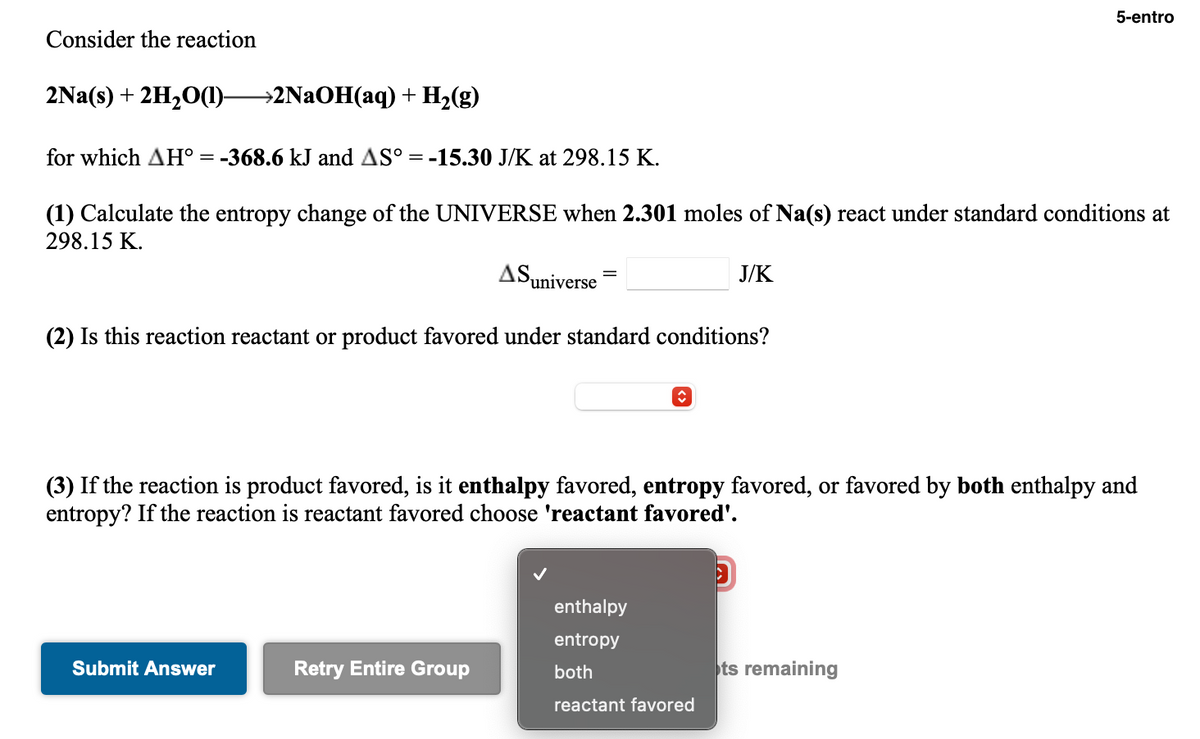Consider the reaction 2Na(s) + 2H2O(1)–2N2OH(aq) + H2(g) for which AH° = -368.6 kJ and AS° = -15.30 J/K at 298.15 K. (1) Calculate the entropy change of the UNIVERSE when 2.301 moles of Na(s) react under standard conditions at 298.15 K. ASuniverse= J/K (2) Is this reaction reactant or product favored under standard conditions? (3) If the reaction is product favored, is it enthalpy favored, entropy favored, or favored by both enthalpy and entropy? If the reaction is reactant favored choose 'reactant favored'. enthalpy entropy Submit Answer Retry Entire Group both ts remaining reactant favored
Consider the reaction 2Na(s) + 2H2O(1)–2N2OH(aq) + H2(g) for which AH° = -368.6 kJ and AS° = -15.30 J/K at 298.15 K. (1) Calculate the entropy change of the UNIVERSE when 2.301 moles of Na(s) react under standard conditions at 298.15 K. ASuniverse= J/K (2) Is this reaction reactant or product favored under standard conditions? (3) If the reaction is product favored, is it enthalpy favored, entropy favored, or favored by both enthalpy and entropy? If the reaction is reactant favored choose 'reactant favored'. enthalpy entropy Submit Answer Retry Entire Group both ts remaining reactant favored
Chemistry & Chemical Reactivity
9th Edition
ISBN:9781133949640
Author:John C. Kotz, Paul M. Treichel, John Townsend, David Treichel
Publisher:John C. Kotz, Paul M. Treichel, John Townsend, David Treichel
Chapter18: Principles Of Chemical Reactivity: Entropy And Free Energy
Section18.5: Entropy Changes And Spontaneity
Problem 3RC
Related questions
Question
100%

Transcribed Image Text:5-entro
Consider the reaction
2Na(s) + 2H20(1)-
→2NAOH(aq) + H2(g)
for which AH° = -368.6 kJ and AS° = -15.30 J/K at 298.15 K.
(1) Calculate the entropy change of the UNIVERSE when 2.301 moles of Na(s) react under standard conditions at
298.15 K.
ASuniverse
J/K
(2) Is this reaction reactant or product favored under standard conditions?
(3) If the reaction is product favored, is it enthalpy favored, entropy favored, or favored by both enthalpy and
entropy? If the reaction is reactant favored choose 'reactant favored'.
enthalpy
entropy
Submit Answer
Retry Entire Group
both
ts remaining
reactant favored
Expert Solution
This question has been solved!
Explore an expertly crafted, step-by-step solution for a thorough understanding of key concepts.
This is a popular solution!
Trending now
This is a popular solution!
Step by step
Solved in 2 steps

Knowledge Booster
Learn more about
Need a deep-dive on the concept behind this application? Look no further. Learn more about this topic, chemistry and related others by exploring similar questions and additional content below.Recommended textbooks for you

Chemistry & Chemical Reactivity
Chemistry
ISBN:
9781133949640
Author:
John C. Kotz, Paul M. Treichel, John Townsend, David Treichel
Publisher:
Cengage Learning

Principles of Modern Chemistry
Chemistry
ISBN:
9781305079113
Author:
David W. Oxtoby, H. Pat Gillis, Laurie J. Butler
Publisher:
Cengage Learning

Chemistry: The Molecular Science
Chemistry
ISBN:
9781285199047
Author:
John W. Moore, Conrad L. Stanitski
Publisher:
Cengage Learning

Chemistry & Chemical Reactivity
Chemistry
ISBN:
9781133949640
Author:
John C. Kotz, Paul M. Treichel, John Townsend, David Treichel
Publisher:
Cengage Learning

Principles of Modern Chemistry
Chemistry
ISBN:
9781305079113
Author:
David W. Oxtoby, H. Pat Gillis, Laurie J. Butler
Publisher:
Cengage Learning

Chemistry: The Molecular Science
Chemistry
ISBN:
9781285199047
Author:
John W. Moore, Conrad L. Stanitski
Publisher:
Cengage Learning


Chemistry
Chemistry
ISBN:
9781305957404
Author:
Steven S. Zumdahl, Susan A. Zumdahl, Donald J. DeCoste
Publisher:
Cengage Learning

Chemistry: An Atoms First Approach
Chemistry
ISBN:
9781305079243
Author:
Steven S. Zumdahl, Susan A. Zumdahl
Publisher:
Cengage Learning